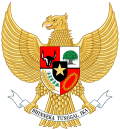History
The Netherlands

Following the Indonesian War of Independence of 1945–1949, the government of the Netherlands transferred sovereignty over the Dutch East Indies to the United States of Indonesia on 27 December 1949. [3] Attempts at disbanding the federation by the unitary Republic of Indonesia and Moluccan distrust of the predominantly Islamic Javanese authorities in Jakarta led to the creation of the Republic of South Maluku (Indonesian : Republik Maluku Selatan, RMS) on 25 April 1950. [3] After the Indonesian invasion of South Maluku and suppression of Moluccan independence, the Dutch government decided on the evacuation of c. 12,000 Moluccan soldiers of the former Royal Netherlands East Indies Army and their dependents to the Netherlands, as they were at risk of retribution and had refused discharge from Dutch service in territories controlled by Indonesian authorities. [4] While the Dutch government had neither supported nor recognized the RMS, its supporters proclaimed a government-in-exile in the Netherlands on 12 April 1966. [3] As of 2010, its president is the Dutch-born John Wattilete and its leadership is in the hands of second-generation Moluccan Dutch. [5]
Fueled by inaction of Moluccan community leaders and government disinterest for the plight of the diaspora, radicalized Free South Moluccan Youths were responsible for a number of terrorist attacks in the Netherlands. These were an arson attempt on the Indonesian embassy in The Hague in 1966, attempted abductions of Indonesian ambassadors in 1970 and 1974, a foiled attempt to abduct Queen Juliana in March 1975, the Wijster train hijacking and Indonesian consulate hostage crisis of December 1975, the De Punt train hijacking and Bovensmilde school hostage crisis of 1977, and the Assen province hall hostage crisis of 1978. [4] Combined, these so-called "Moluccan Actions" (Dutch : Molukse Acties) resulted in the deaths of seven civilians, six attackers, and a policeman, and remain controversial. [6]
